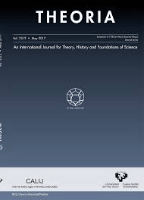
THEORIA-REVISTA DE TEORIA HISTORIA Y FUNDAMENTOS DE LA CIENCIA
Scope & Guideline
Bridging Philosophy and History in Science
Introduction
Aims and Scopes
- Philosophical Analysis of Scientific Theories:
The journal emphasizes rigorous philosophical analysis of scientific theories, exploring their foundations, implications, and the epistemic assumptions underlying them. - Interdisciplinary Approaches:
It promotes interdisciplinary dialogue, integrating perspectives from philosophy, history, biology, physics, and cognitive science to enrich discussions on scientific practices and theories. - Critical Examination of Scientific Practices:
The journal critically examines contemporary scientific practices, including the roles of models, causation, and evidence in shaping scientific knowledge. - Exploration of Normative Dimensions:
A focus on the normative dimensions of scientific inquiry, such as the ethical implications of scientific advancements and the societal responsibilities of scientists. - Engagement with Historical Contexts:
It encourages engagement with historical contexts of scientific development, analyzing how historical narratives shape contemporary scientific understanding.
Trending and Emerging
- Quantum Mechanics and Philosophy:
There is an increasing focus on the philosophical implications of quantum mechanics, including discussions on ontology, hidden variables, and the nature of reality as influenced by quantum theories. - Pluralism in Science:
The theme of pluralism, especially in relation to scientific methods and theories, is gaining traction, highlighting the importance of diverse perspectives in understanding complex scientific phenomena. - Causal Inference and Mechanisms:
Recent publications emphasize causal inference and the examination of mechanisms in scientific explanation, reflecting a growing interest in how causal relationships are understood and modeled. - Ethics and Science:
The examination of ethical dimensions in scientific practice, including discussions on eugenics and the implications of genetic improvement programs, is increasingly prevalent, indicating a heightened awareness of the societal impacts of scientific research. - Complexity and Interdisciplinarity:
Emerging themes around complexity and the need for interdisciplinary approaches in addressing scientific questions are on the rise, suggesting a shift towards integrating knowledge across disciplines to tackle multifaceted issues.
Declining or Waning
- Reductionism in Science:
There has been a noticeable decline in papers focusing on reductionist approaches to scientific theories, possibly indicating a shift towards more holistic or pluralistic perspectives. - Classic Logical Positivism:
Themes related to classic logical positivism and verificationism appear less frequently, suggesting a waning interest in these frameworks as contemporary philosophy of science evolves. - Determinism in Scientific Discourse:
Discussions centered on determinism, particularly in the context of quantum mechanics, are appearing less frequently, indicating a shift towards exploring probabilistic and indeterminate models.
Similar Journals
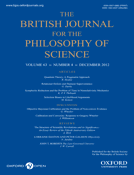
BRITISH JOURNAL FOR THE PHILOSOPHY OF SCIENCE
Illuminating the Philosophical Dimensions of ScienceThe British Journal for the Philosophy of Science, published by University of Chicago Press, stands as a leading journal in the fields of philosophy and history of science. With its ISSN 0007-0882 and E-ISSN 1464-3537, this esteemed publication has been pivotal in advancing philosophical discussions surrounding scientific practice since its inception in 1950. Covering a diverse range of topics and critical analyses, it holds an impressive track record within the academic community, consistently achieving Q1 rankings across several categories, including History, Philosophy, and History and Philosophy of Science. With a Scopus rank placing it in the top percentiles of its respective fields, the journal is recognized not only for its academic rigor but also for its role in shaping contemporary philosophical discourse. While it is not an open-access journal, the British Journal for the Philosophy of Science provides essential insights and fosters critical thinking, making it an indispensable resource for researchers, professionals, and students dedicated to the nuanced interplay between science and philosophy.

European Physical Journal H
Unveiling the Evolution of Physics Through Scholarly DiscourseThe European Physical Journal H (EPJ H) is a distinguished peer-reviewed academic journal dedicated to the history and philosophy of physics, published by SPRINGER HEIDELBERG in Germany. With an ISSN of 2102-6459 and an E-ISSN of 2102-6467, the journal aims to bridge the gap between historical context and contemporary scientific advancements in the field of Physics and Astronomy. Although it holds a Q4 quartile ranking in the 2023 category for Physics and Astronomy (miscellaneous) and occupies the 161st position out of 243 in Scopus rankings, EPJ H has a vital role in facilitating discourse among researchers and educators interested in retracing the evolution of concepts and discoveries within physics. Emphasizing the importance of interdisciplinary dialogue, the journal provides open access options to ensure that its scholarly contributions are readily available to a global audience, thereby enhancing educational resources and research visibility. The timeline of publication spans from 2010 to 2024, making it an up-to-date resource for those exploring the intricate historical landscape of physical sciences.
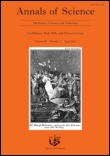
ANNALS OF SCIENCE
Unveiling the Rich Tapestry of Scientific ThoughtANNALS OF SCIENCE, published by Taylor & Francis Ltd, is a pivotal journal in the field of the History and Philosophy of Science, as evidenced by its Q3 categorization and a respectable Scopus rank of 99 out of 223, placing it in the 55th percentile among its peers. With a rich history dating back to its initial publication in 1936, the journal has made significant contributions to scholarly discourse, providing a platform for researchers and academics to explore the intricate connections between scientific developments and philosophical inquiries. The journal's commitment to rigorous academic research ensures that it remains a vital resource for professionals, educators, and students dedicated to understanding the evolution of scientific thought. Although it operates under traditional subscription models, the journal's importance in shaping modern scientific discussions cannot be overstated, making it an essential read for those engaged in the multifaceted study of science's history and philosophical implications.

European Journal for Philosophy of Science
Fostering Interdisciplinary Insights in Science and PhilosophyThe European Journal for Philosophy of Science, published by SPRINGER, stands as a prestigious platform for scholars in the realms of philosophy and history of science. With an impressive impact factor and categorized in the Q1 Quartile for both History and Philosophy of Science and Philosophy, this journal ranks among the top 10% of its peers, reinforcing its critical role in advancing academic discussions and insights within these fields. With its composition of rigorous peer-reviewed articles and a commitment to fostering interdisciplinary dialogue, the journal navigates foundational and contemporary issues that shape scientific inquiry. Although currently not Open Access, it provides invaluable access to researchers, professionals, and students who seek to deepen their understanding of the philosophical underpinnings of scientific practice. Housed in the Netherlands, the journal continuously engages with the evolving landscape of philosophy in the scientific domain, making it a key resource for anyone invested in the intersection of science and philosophy.
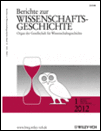
Berichte zur Wissenschaftsgeschichte
Deciphering the Philosophical Threads of Scientific ProgressBerichte zur Wissenschaftsgeschichte is a distinguished journal dedicated to the critical exploration of the history of science and its philosophical underpinnings, published by WILEY-V C H VERLAG GMBH in Germany. Since its inception in 1978, this authoritative journal has served as a vital resource for scholars, practitioners, and students alike, contributing to a deeper understanding of scientific developments across historical contexts. The journal holds a respectable Scopus rank in the arts and humanities, placing it in the 79th percentile among history publications and the 56th percentile in history and philosophy of science, marking it as an essential venue for impactful research. Berichte zur Wissenschaftsgeschichte encourages contributions that advance scholarly dialogue and foster an interdisciplinary approach, making it a pivotal platform for the exchange of ideas in the evolving discourse of science history. While it currently does not offer Open Access options, the journal's subscription model ensures that its curated content remains accessible to a global audience dedicated to the interdisciplinary analyses of science's past.

PHYSICS IN PERSPECTIVE
Connecting Eras: Physics from Yesterday to TodayPHYSICS IN PERSPECTIVE, published by SPRINGER BASEL AG, is an esteemed journal dedicated to the intricate interplay between the history of physics and its contemporary implications. With an ISSN of 1422-6944 and an E-ISSN of 1422-6960, this journal has established itself as a pivotal resource for researchers, scholars, and students who seek a deeper understanding of physics through a historical lens. The journal enjoys a Q1 ranking in History and a Q3 ranking in Physics and Astronomy (miscellaneous), illustrating its significance in the arts and humanities as well as its notable contributions to physics scholarship. Published in Switzerland, it provides a unique platform for interdisciplinary dialogue, combining historical analysis with modern physics discussions. As it continues to grow through its converged years from 1999 to 2024, PHYSICS IN PERSPECTIVE remains committed to enriching the academic community and fostering innovative research that bridges the past and present of the physical sciences.
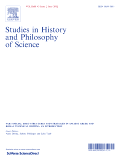
STUDIES IN HISTORY AND PHILOSOPHY OF SCIENCE
Exploring the Intersections of History and Philosophy in ScienceSTUDIES IN HISTORY AND PHILOSOPHY OF SCIENCE, published by Elsevier Science Ltd, is a leading academic journal dedicated to the exploration of historical and philosophical dimensions of science. With both an ISSN of 0039-3681 and E-ISSN of 1879-2510, this esteemed journal has established itself as a pivotal resource since its inception in 1970 and continues to publish cutting-edge research reflecting the evolution of scientific thought. Situated in the United Kingdom, it is recognized for its high-impact contributions, boasting a Q1 ranking in both History and History and Philosophy of Science categories as of 2023. Researchers in the humanities will benefit from the journal’s rigorous analysis and insightful discussions, as evidenced by its competitive Scopus rankings—placing it in the 96th and 83rd percentiles in their respective fields. Although not an open-access journal, it maintains a commitment to scholarly excellence, aiming to foster a deeper understanding of the interconnections between historical context and philosophical inquiry in the scientific domain, making it an invaluable resource for students, professionals, and researchers alike.

JOURNAL OF THE HISTORY OF BIOLOGY
Celebrating the Legacy of Biological ThoughtJOURNAL OF THE HISTORY OF BIOLOGY, published by Springer, stands as a vital academic resource devoted to examining the historical development of biological science and its philosophical dimensions. This esteemed journal, which has been in continuous publication since 1968 and encompasses research through 2024, is recognized for its significant contributions to the fields of Agricultural and Biological Sciences, and the History and Philosophy of Science, proudly holding a Q2 ranking in both categories as of 2023. With an ISSN of 0022-5010 and an E-ISSN of 1573-0387, it serves a diverse audience of researchers, professionals, and students interested in the interplay between biological advancements and historical context. The journal’s particular emphasis on interdisciplinary investigation provides a platform for innovative scholarship that enriches our understanding of not only the science itself but also its societal implications. While it does not currently offer open access, the rigor and reputation of the journal underscore its importance as a leading publication in the academic landscape of biological history.

Epistemology & Philosophy of Science-Epistemologiya i Filosofiya Nauki
Elevating the Standards of Philosophical ResearchEpistemology & Philosophy of Science-Epistemologiya i Filosofiya Nauki is a prestigious journal published by the Russian Academy of Sciences - Institute of Philosophy, dedicated to advancing the discourse in the fields of epistemology, philosophy of science, and related disciplines. With a distinguished presence in academia, this journal is recognized for its exceptional contributions, evident through its categorization as a Q2 journal in Arts and Humanities and Philosophy, and a Q1 journal in Cultural Studies. Covering an expansive scope from 2017 to 2023, it facilitates a vital dialogue among scholars and professionals aiming to explore the intersections of knowledge, culture, and education. Although currently not open access, the rigorous peer-review process ensures that only high-quality research is published, enriching the intellectual landscape. The journal's commendable rankings in Scopus, particularly in Arts and Humanities and History and Philosophy of Science, reflect its commitment to scholarly excellence. For researchers, educators, and students, Epistemology & Philosophy of Science serves as an essential resource for understanding and contributing to the ongoing philosophical dialogues that shape our comprehension of scientific inquiry.

ERKENNTNIS
Fostering vibrant exchanges in scholarly thought.ERKENNTNIS, published by SPRINGER, is a premier academic journal that has been advancing the study of philosophy and logic since its inception in 1919. With its esteemed ranking in the Q1 quartile for both categories as of 2023, it stands at the forefront of scholarly discourse, earning an impressive rank of #104 in the field of philosophy and #13 in logic according to the Scopus rankings. This influential publication not only contributes to the theoretical underpinnings of these disciplines but also fosters a vibrant exchange of ideas among researchers, professionals, and students alike. While it does not offer open access to its articles, the journal's esteemed reputation and rigorous peer-review process ensure that all published works maintain the highest standards of quality and intellectual inquiry, making ERKENNTNIS an essential resource for anyone engaged in these critical areas of study.